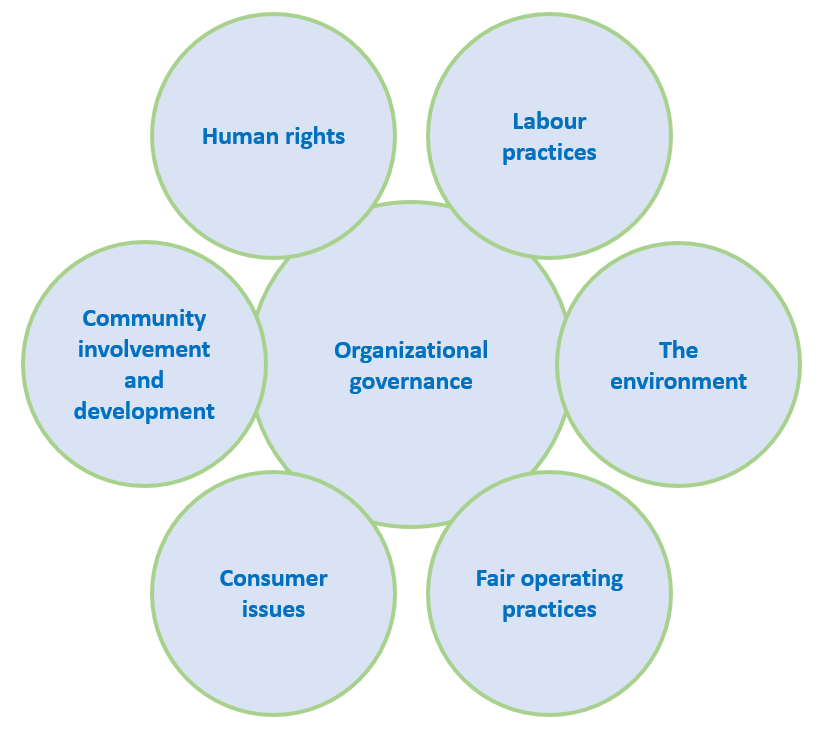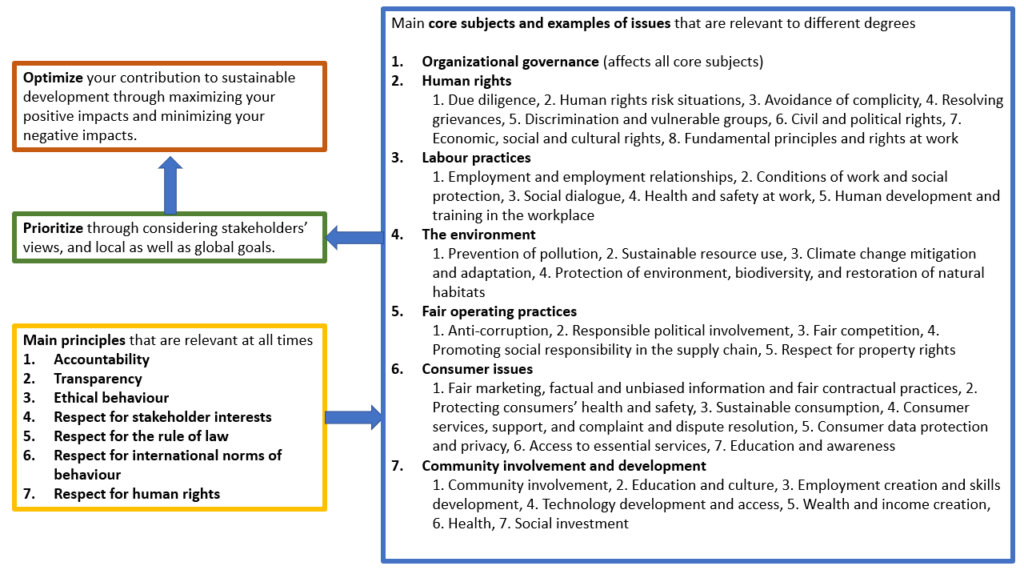Standards
Standards
We have used many sources, we call them sustainability standards, to develop SustCoReport and we especially recommend the following standards for your next steps after kick-starting your sustainability work with SustCoReport.
ISO 26000
It takes on average 3,5 years to develop an ISO standard provided that the 160+ member countries in ISO votes in favor of that 1) the need exists, and that 2) the final draft is good enough. Each country has one vote, regardless of size, and votes through its National Standards Bodies. The national work in international standardization is done by volunteers participating in national committees.
ISO 26000 Guidance on Social responsibility was developed through an open process that involved more than 400 experts from 100 countries and 40 international organizations. After 5 years the close to 100 pages were published with the aim to give guidance to all types of companies and organizations that want to maximize their contribution to sustainable development. The standard has been re-confirmed 3 times since 2010 through balloting the 160+ ISO member countries. It is not certifiable but can, of course, be verified through auditing.
The international standard ISO 26000 contains some 450 recommendations around 7 main principles, 7 core subjects with 37 issues, stakeholders, priorities, inter alia. Internationally ISO 26000 has been used especially in countries and markets where robust tools were missing. Small and medium-sized companies and organizations benefit from having a combined document that embraces both principles and concrete advice that are aligned with for example ISO 9001, ISO 14001, UN Global Compact – and does not require too much consultancy help to use. More information: https://iso26000.info which is linked to from ISO website, or buy a copy of the standard from your national standards body (example Sweden: Swedish Institute for Standards) or ISO.
ISO has published a great brochure, developed for ISO by one of the founders of SustCoReport, that illustrates how the use of ISO 26000 contributes to the United Nation’s global goals for sustainable development.
UN Global Compact
United Nation’s Global Compact: 10 principles for responsible business that we at SustCoReport also recommend to those that want to learn more about the core subjects of sustainability work:
Human Rights
Principle 1: Businesses should support and respect the protection of internationally proclaimed human rights; and
Principle 2: make sure that they are not complicit in human rights abuses.
Labour
Principle 3: Businesses should uphold the freedom of association and the effective recognition of the right to collective bargaining;
Principle 4: the elimination of all forms of forced and compulsory labour;
Principle 5: the effective abolition of child labour; and
Principle 6: the elimination of discrimination in respect of employment and occupation.
Environment
Principle 7: Businesses should support a precautionary approach to environmental challenges;
Principle 8: undertake initiatives to promote greater environmental responsibility; and
Principle 9: encourage the development and diffusion of environmentally friendly technologies.
Anti-Corruption
Principle 10: Businesses should work against corruption in all its forms, including extortion and bribery.
Self-declaration
Any company or organization can self-declare how a standard has been applied. Credibility can be enhanced if an independent auditor confirms correctness and for some standards there are even accredited auditors that can issue certifications, e.g. ISO 14001, ISO 9001.
There are some standards for self-declaring the use of ISO 26000, for example the ISO 26000 Publication Platform in the Netherlands.
Late 2021 the revised Swedish standard TS 2 Self-declaration of social responsibility was published. It offers a possibility for companies and organizations, in Sweden mainly, who want to self-declare how they contribute to sustainable development. TS2 contains 50 questions that can be replied to based on the guidance given in TS2, and used as a basic sustainability report. It was developed by volunteering experts in the national committee of the National Standards Body in Sweden, member of ISO.
The SustCoReport tool responds to the most difficult questions in TS2, the core of ISO 26000, and the remaining questions in TS2 are relatively easy to respond to by those who want to apply the full TS2 standard. Download the 50 questions of Swedish standard TS2 here, unofficially translated by SustCoReport from Swedish to English.
Illustrations
Some illustrations that can inspire your next steps.


